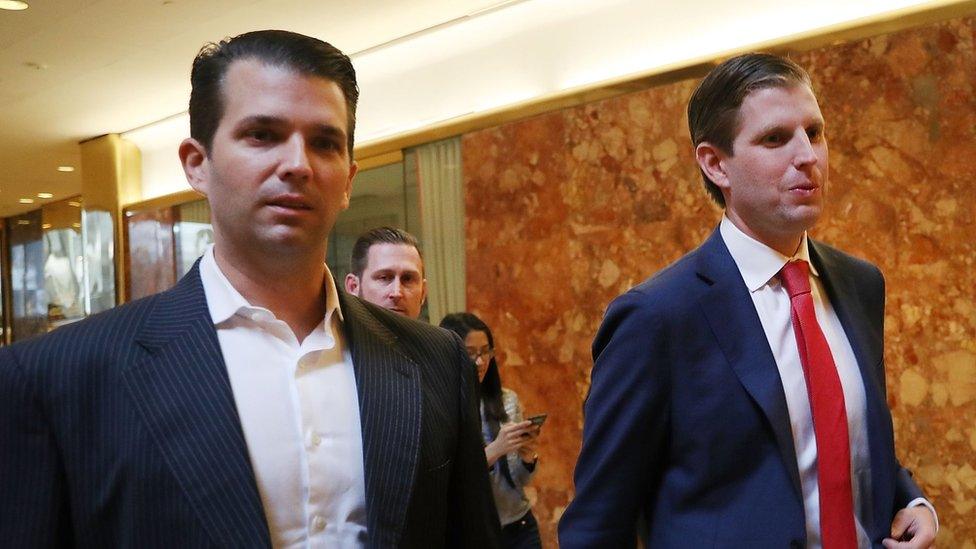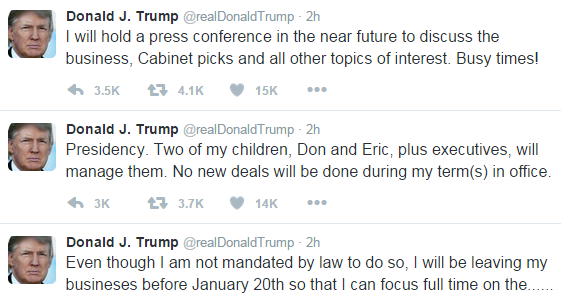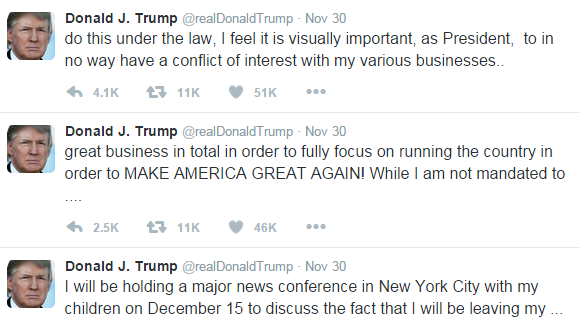Donald Trump: 'No new business deals' during presidency
- Published

Trump will put his sons in charge, but some critics argue this is not enough
Donald Trump has said his sons will run his businesses during his presidency but there will be "no new deals".
He tweeted he would "hold a news conference in the near future", after delaying an announcement on how to handle his business interests.
The US president-elect had been due to hold a rare press conference on the matter on Thursday.
Mr Trump also said that he would make an announcement about his choice for secretary of state on Tuesday.
On his Twitter account, Mr Trump said that, although he was not mandated by law to do so, he would leave his businesses before 20 January, when he will be inaugurated president.
"Two of my children, Don and Eric, plus executives, will manage them," he tweeted. "No new deals will be done during my term(s) in office."
No mention has been made of the role of Mr Trump's high-profile daughter, Ivanka, fuelling speculation that she might have a role in his administration.

Risk of impeachment - John Mervin, BBC News, New York
If Mr Trump retains ownership, or just some financial interest in his business, then the threat of a constitutional crisis looms over his presidency. His insistence that there's no law which forces the president to be free of business interests doesn't only ignore decades, even centuries of convention. It's also an explicit disavowal of the constitution itself.
The US federal government's founding document specifically prohibits US office holders from receiving presents or emoluments (defined as "the returns arising from office or employment" - ie payment) from foreign governments.
It's hard to see how even the most straightforward of business transactions between the Trump organisation and an overseas company wouldn't threaten to put President Trump in breach of that clause. Commentators and political rivals have raised this problem time and again, first during Trump's campaign, but in particular since his stunning victory.
That he still won't address it head on suggests either that he's still seeking a way of reconciling his business interests with his presidential obligations - and will unveil it later.
Or that he intends to run the risk of congress one day deciding that his conflicts of interest are so great that he has to be impeached.


Mr Trump's transition team spokesman, Sean Spicer, said Thursday's press conference had been postponed to make sure "proper protocols are put in place".
"With so many iconic properties and successful entities, moving the announcement to January ensures the legal team has ample time to ensure the proper protocols are put in place so his sole focus will remain on the country and achieving his ambitious agenda with the help of the world-class cabinet he has built," Mr Spicer wrote in an email statement to Associated Press.
Critics have said Mr Trump runs many businesses which all present possible conflicts of interests.
"It makes no sense to say 'no new deals," said Richard W Painter, a White House ethics adviser under President George W Bush.
"Is he going to continue to borrow money from foreign banks like Bank of China? That is a deal," Mr Painter told the New York Times. "Or collect rent from foreign government-owned companies? That is a deal. Will he still be hiring people, or having people stay in his hotels?"

Mr Trump's extensive domestic and international business interests include hotels and golf courses, including two in Scotland, as well as a variety of real estate holdings: ownerships or investments in hotels, offices and residential buildings.
Last month, Mr Trump issued a series of tweets pledged to "leave my great business in total" saying it was "visually important" to "in no way have a conflict of interest".



Media reports suggested that the delay in outlining how he plans to separate his business interests from his presidency was also due to his focus on a number of high-profile cabinet appointments he has been making.
Mr Trump said he was appointing Goldman Sachs President Gary Cohn as his "top economic adviser".
Mr Cohn will head the White House National Economic Council, a position that will make him one of the most influential voices on economic decisions in the White House.
The Goldman Sachs president is the third person from the bank to join Mr Trump's cabinet. Steven Mnuchin - the incoming treasury secretary - and Steve Bannon - the new senior White House adviser are both former executives.